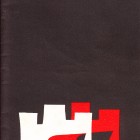Fiery Angel 1970Frankfurt Opera
Read more about the opera Fiery Angel
The opening event of the Festival brought the great singing actress Anja Silja back for her third role in Edinburgh, following Lulu in 1966 and Senta in 1968. On opening night the lights in the orchestra pit fused ten minutes into the show, just as she was getting into her stride, and after a few minutes to carry out repairs the performance started again. However Silja quickly regained her previous intensity and maintained that grip throughout the evening in a remarkable performance, even if her voice had an unattractive wobble at times - not altogether inappropriate given the level of hysteria at which Renata operates.
The production looked impressive - a large box (house-shaped) filled the stage and was fronted by a pair of monumental bronze doors that swung open to reveal appropriate interiors - inn, convent, etc. There was also space for a playing area in front when the chorus or greater levels of activity were required.
The orchestra and conductor were excellent as were most of the cast, generally little-known company regulars. Rudolf Constantin's only other appearance in Britain was at Covent Garden (Mandryka in Arabella). He was an effective actor. Sona Cervena was already familiar to Scottish audiences, but only had a short character role - but she was singing a much more important part every other night that week in the Scottish Opera cast of a rare Henze work.
Willy Müller coped well with the exposed tenor role of the necromancer Agrippa von Nettesheim. The final sequence was dominated by the imposing bass Dieter Weller as the Inquisitor who restores order and consigns Renata to the flames. A then unknown Greek mezzo called Agnes Baltsa was listed in the programme, but did not sing the first night (no announcement, not a programme insert, just a scribbled notice stuck on the foyer wall). Did she sing the second night? If so, it was this great singer's only operatic role in Scotland.
For most of the audience the opera was an interesting novelty. Not all the critics loved the show - those who knew the piece from its British premiere five years before were particularly scathing. They complained of cuts and editorial decisions that were debatable at best. Since the cuts included the end of the second and the whole of the fourth act, they clearly had a point. This abbreviation seems to have been the result of German cultural antipathy to any treatment of the Faust legend that differed from Goethe. Mephistopheles appears every bit as sardonic and witty as in the long-despised Gounod treatment. Here the characters of Faust and Mephistopheles vanished altogether, making a nonsense of some of the action. Since their presence is necessary for Ruprecht's appearance after he is wounded in the duel with Heinrich, the rather arbitrary decision was taken to kill him off. Scottish audiences had to wait until 2017 for the work to be given complete by Scottish Opera.
This being Edinburgh in 1970, the main issue for the local and national tabloid press, and for some local politicians, not known for their cultural interests, concentrated beforehand on whether the climactic scene, as rumoured, would feature an orgy with topless nuns, or not. It did, and they were - some newspapers had even got hold of some extremely fuzzy photographic evidence. The world did not come to an end. This fuss was, however, a superb marketing ploy, so a little known and potentially difficult work played to two packed houses. Even the BBC got in on the act, broadcasting a short report on the following morning's Today programme on Radio 4.
Opera at the Edinburgh Festival - 1970
1970 saw a very successful mix of operas at the Festival. The Czechs from Prague's National Theatre, returning after the success of their 1964 visit, once more brought five productions. There was again a British premiere, The Excursions of Mr Brouček. The others were the popular Bartered Bride, Dalibor (repeated from 1964), and two works familiar in London, but new to Scotland - The Cunning Little Vixen and The Makropulos Case. or Affair as it was billed here. The two other Festival operas were also great rarities. Proceedings opened with the Frankfurt Opera, who brought their controversial staging of Prokofiev's Fiery Angel. The director and designer were the Czech pair responsible for Makropulos and Dalibor (also the 1964 Rusalka and a superb production of Pelléas et Mélisande at Covent Garden). Scottish Opera's excellent contribution was just as enterprising - Henze's acerbic Elegy for Young Lovers, directed by the composer himself.
In summary, the operas were: Smetana (Bartered Bride, Dalibor); Janáček (Adventures of Mr Brouček, Cunning Little Vixen, Makropulos Case); Prokofiev (Fiery Angel); Henze (Elegy for Young Lovers).
The Festival's opera schedule was as follows:
First week, commencing 24 Aug: Mon Fiery Angel; Tue Elegy for Young Lovers; Wed Fiery Angel; Thu Elegy for Young Lovers; Fri no perf; Sat Elegy for Young Lovers.
Second week, commencing 31 Aug: Mon Bartered Bride; Tue Dalibor; Wed Cunning Little Vixen; Thu Makropulos Case; Fri Bartered Bride; Sat Excursions of Mr Brouček.
Third week, commencing 7 Sep: Mon Dalibor; Tue Makropulos Case; Wed Excursions of Mr Brouček; Thu Cunning Little Vixen; Fri Bartered Bride; Sat Dalibor.
Performance Cast
- Renata a woman loved by Ruprecht
- Ruprecht a knight
- Hostess at the inn
- Potboy at the inn
- Fortune Teller
- Jakob Glock a bookseller
- Agrippa von Nettesheim a philosopher and magician
- Count Heinrich von Otterheim Renata's 'Fiery Angel'
- Servant to Count Heinrich
- Doctor
- Mathias Wissmann Ruprecht's old university friend
- Abbess
-
Elsie Maurer (Aug 24)
Agnes Baltsa (Aug 26)
- Inquisitor
- First Nun
- Second Nun
